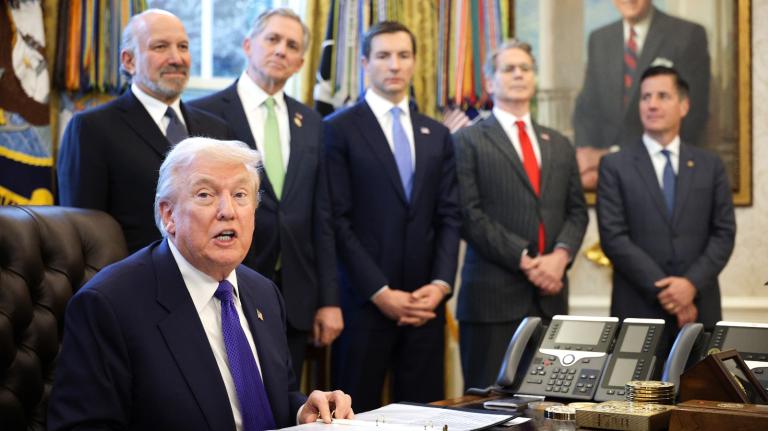Democrats in the House have come close to agreement on a sweeping climate and energy bill. It’s weaker than the original version, but backers say it has enough support to pass.
“We have resolved a good number of the issues,” Rep. Henry Waxman (D-Calif.), chair of the Energy and Commerce Committee, told reporters after a meeting of committee Democrats Tuesday night. “I believe we’ll have the votes for passage.”
Waxman and bill cosponsor Ed Markey (D-Mass.) had to wheel and deal to get the support of moderate Democrats from the South and Midwest, who had lots of concerns about the original draft. Some of the Dems may still vote against the bill, but Waxman believes enough of them are on board to move forward.
President Barack Obama praised the deal and Waxman’s work during a summit on health-care reform on Wednesday. “I want to take a moment, before I start talking about health care, just to congratulate Chairman Waxman and the Energy and Commerce Committee Democrats, who’ve made such extraordinary progress in reaching a deal on comprehensive energy reform and climate legislation. This is a major step forward in building the kind of clean energy economy that will reduce America’s dependence on foreign oil.”
Waxman plans to release the full text of the revised bill on Thursday. Next week, the Energy and Environment Subcommittee and then the full Energy and Commerce Committee will begin offering and debating amendments, with the aim of passing the bill by Friday May 22, before the Memorial Day recess.
Republicans on the committee — none of whom are expected to support the bill — will do what they can to slow down and derail the process by offering dozens or even hundreds of amendments. “Bring your NoDoz Tuesday, Wednesday, Thursday,” said Rep. Fred Upton (Mich.), the ranking Republicans on the Energy and Environment Subcommittee. “Lots of coffee.”
Meanwhile, interest groups across the spectrum will be making a full-court press to change the bill to their liking.
Ch-ch-ch-changes
The revised text of the bill is not yet available, but some notable changes have been announced.
Near-term emissions reductions: The bill now calls for greenhouse-gas emissions to be cut 17 percent below 2005 levels by 2020, down from 20 percent in the original draft (but higher than the 6 percent some moderate Dems wanted). The longer-term targets remain intact — 45 percent cuts by 2030 and 85 percent by 2050.
Renewable electricity standard: The RES now requires 20 percent of electricity to be produced from renewable sources by 2020, with up to 5 percent of that coming from efficiency improvements. The draft bill called for an RES of 25 percent by 2025. More flexibility has also been built into the RES: If a state determines that it cannot meet the renewable target, it can increase the efficiency component to 8 percent and produce just 12 percent of its power from renewables. This change is meant to allay concerns of many southeastern Democrats that their states don’t have the renewable resources to meet a higher target.
“The revisions which are being made to the RES appropriately recognize regional differences by making necessary improvements to expand the list of qualifying fuels and to lower the alternative compliance payment,” said Rick Boucher (D-Va.), one of the committee members who took issue with the original RES proposal. “With these vital changes, I believe that we have created a balanced and responsible policy to advance deployment of renewable electricity, and I am pleased with the product we are able to put forward on this issue.”
Pollution permits: The bill would hand out the majority of emission permits free of charge, rather than making industrial polluters purchase them at auction. The original draft of the bill didn’t specify how permits would be distributed.
Under the current deal, 35 percent of the total allowances under the cap would be given to local electricity distribution companies in the initial years of the program. It’s not yet when and how those free allocations would scale down. Energy-intensive industries like steel, cement, and paper manufacturers would get 15 percent of the permits until 2025. At that point, the president would determine whether those free allowances were still needed.
“We’ve worked hard to develop legislation that will dramatically reduce CO2 emissions while preserving energy-intensive U.S. manufacturing jobs and protecting consumers from substantially higher electric bills — and I believe that the agreement we’ve reached will do just that,” said Rep. Mike Doyle (D-Pa.), who worked with Rep. Jay Inslee (D-Wash.) to develop the compromise language on permit allocation.
It’s also not yet clear how many — if any — credits would be distributed to petroleum and natural-gas refiners, though estimates range from 1 to 5 percent. As of Wednesday night, it appeared that the bill’s authors were still negotiating with two Texas Democrats, Gene Green and Charlie Gonzalez, on this issue.
Another deal made to please moderates, particularly John Dingell (D-Mich.), stipulates that the automobile industry would receive 3 percent of permits between 2012 and 2017, scaling back to 1 percent through 2025. The allowances will help “spur more innovations and new, green job creation here at home,” Dingell said on Wednesday.
Preliminary reactions
Many interest groups are waiting to see the final bill in its entirety before offering up their reviews. But both greens and industry reps have indicated that the changes they’ve heard about so far don’t satisfy them, and they’re gearing up to try to influence the bill as it moves forward.
Sierra Club: “Chairmen Waxman and Markey have done heroic work in reaching agreement on the Energy and Commerce Committee around a comprehensive clean energy and climate plan, a critically important milestone that has faced seemingly insuperable obstacles,” Sierra Club Executive Director Carl Pope said in a statement. But he continued, “It is clear that Big Oil, Big Coal and other polluters are still holding out for a congressional bailout. They will continue to try to riddle this legislation with loopholes, water it down, and load it up with hundreds of billions of dollars in giveaways.”
National Wildlife Federation: Joe Mendelson, NWF’s director of global warming policy, said his group will push for improvements, but praised the process so far. “We understand that there are some deals that are cut, but … the House has hammered out this agreement and is ready to move forward and actually pass climate legislation, which is monumental.”
Greenpeace: Damon Moglen, Greenpeace’s director of global warming programs, expressed concern that the bill has been watered down during the negotiating process — and his group had already criticized the earlier draft for being too lenient.
Greenpeace is particularly unhappy about the lowering of near-term emission targets. “The goals need to be based on science and not on some political calculation about what industry lobbyists will accept and what they won’t accept,” said Moglen. “We are really worried if those goals are not taken seriously, and if the legislation doesn’t track the necessary, scientifically mandated goals, the legislation really could not serve their purpose.”
Moglen also pointed out that a weaker bill could hamper negotiations toward a new global climate treaty, which is supposed to be hashed out by the end of this year. “There is a real risk, if what is put forward is very weak … then we can see those negotiations starting at the floor and not the ceiling,” he said. “If the U.S. policy sets an inadequate series of goals and processes in place, those could become global.”
Environmental Defense Fund: EDF has been more positive about the deal-making. The group is a member of the U.S. Climate Action Partnership, an alliance of business and environmental groups whose blueprint for climate legislation formed the basis of the bill.
“To see a committee as diverse as Energy and Commerce get as close to actually producing legislation is really quite remarkable,” said Steve Cochran, director of EDF’s National Climate Campaign. “It does look like Mr. Markey and Mr. Waxman have broken the lock here.”
Cochran said that because many of moderates’ biggest concerns have been addressed, the bill has a better chance of passing through the committee, the full House, and ultimately the Senate, where climate policy in thought to be a tougher sell.
Duke Energy Corp.: A spokesperson for Duke, one of the key industry players in USCAP, said the company is waiting to see the full bill before offering an opinion. But Duke CEO Jim Rogers is now appearing in television ads sponsored by EDF that call for passage of a climate bill this year.
Electric Reliability Coordinating Council: Scott Segal, director of the ERCC, which lobbies on behalf of power companies, was less enthusiastic. He said it’s unclear whether the near-term targets will allow enough time for companies to get new technologies in place to curb emissions. He has called for the bill to include a so-called safety valve, which would effectively put a ceiling on the cost of emission permits, and for more flexibility on the use of offsets.
“While I think that a lot of the changes in the legislation from a cost perspective constitute steps in the right direction, it’s a little premature to say there’s a deal,” said Segal.
He also worries that the one-week schedule for markup of the bill is too tight. “I hope even with a truncated schedule like this there will be time to air all of these issues,” said Segal. “If there isn’t enough time, then the bill will be weaker for it.”
But Segal does think Waxman is serious about sticking to his self-imposed Memorial Day deadline. “He has a reputation for determination, and I suspect that if he has to do 24-hour-a-day markups, he’ll do it, to get it done.”




